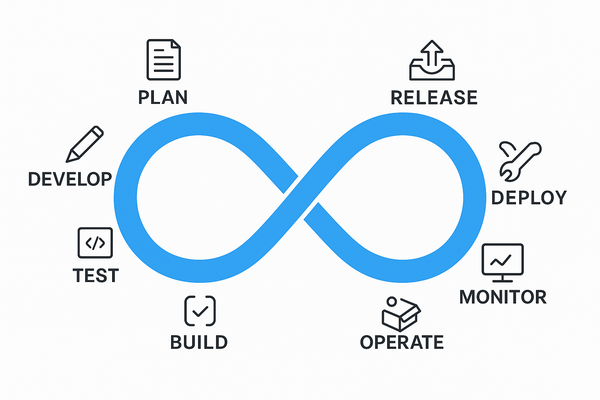
Introduction
The question “Are DevOps engineers in demand in 2025?” is echoing across tech communities, job boards, and LinkedIn posts. As organizations embrace digital transformation, cloud computing, automation, and agile development practices, DevOps has become the glue that holds modern software delivery together. In 2025, this trend has only intensified.
In this blog, we’ll explore:
- Why DevOps engineers are in high demand
- Real-world industry trends and job market analytics
- The future outlook for DevOps
- Key skills companies are hiring for
- How you can build a successful career in DevOps
Let’s dive in.
What is DevOps?
DevOps is a combination of Development and Operations — a cultural, engineering, and automation movement aimed at shortening the system development lifecycle. It promotes:
- Continuous Integration and Continuous Delivery (CI/CD)
- Infrastructure as Code (IaC)
- Automation
- Monitoring and Feedback
It helps businesses deliver software faster, with fewer bugs, and better alignment to customer needs.
Is DevOps in Demand in 2025?
Yes — more than ever before. Here’s why:
1. Digital Transformation is Accelerating
- Post-COVID, companies fast-tracked digital operations.
- In 2025, nearly every industry — from banking to healthcare to education — is powered by software.
- Businesses are building and deploying apps rapidly, and DevOps engineers are essential to scale this effort.
2. Cloud Adoption Is Exploding
- AWS, Azure, and Google Cloud dominate infrastructure.
- Cloud-native architectures (Kubernetes, containers, serverless) need skilled professionals to manage and automate deployments.
- DevOps engineers are at the center of managing cloud environments efficiently.
3. Shift-Left Practices Are Going Mainstream
- Security, testing, and performance are being integrated earlier in the development lifecycle.
- This requires DevOps engineers who understand not only CI/CD but also DevSecOps, QA Automation, and SRE (Site Reliability Engineering).
4. Companies Are Investing in DevOps Toolchains
- Tools like Jenkins, GitLab, Terraform, Ansible, Docker, Kubernetes, and Prometheus are becoming industry standards.
- DevOps engineers who master these tools are top hiring priorities.
What the Job Market Says
According to multiple reports:
- DevOps engineer consistently ranks in the Top 10 most in-demand tech jobs.
- On platforms like LinkedIn, Indeed, and Glassdoor, job postings for DevOps roles have increased 20%–30% YoY in 2025.
- Enterprises, startups, and even government sectors are hiring DevOps engineers to accelerate delivery.
Salary Insights:
- Entry-Level: $80,000 – $100,000/year
- Mid-Level: $100,000 – $130,000/year
- Senior-Level: $130,000 – $170,000/year
- Freelance DevOps Experts: $60–$150/hour
Remote roles have surged, giving engineers the ability to work globally.
Industries Hiring DevOps Engineers in 2025
- Finance & FinTech – Automating deployments and ensuring security.
- Healthcare – Managing HIPAA-compliant infrastructure.
- E-Commerce – Scaling platforms during high-traffic events.
- Gaming – Real-time monitoring, autoscaling game servers.
- AI & ML – DevOps for ML pipelines (aka MLOps).
Top Skills Employers Are Looking For
If you want to be a DevOps engineer in demand, here are the top skills companies value:
🛠 Technical Skills:
- CI/CD Pipelines: Jenkins, GitHub Actions, GitLab
- Containers & Orchestration: Docker, Kubernetes, Helm
- Cloud Platforms: AWS, GCP, Azure
- Infrastructure as Code: Terraform, CloudFormation, Pulumi
- Configuration Management: Ansible, Chef, Puppet
- Monitoring & Logging: Prometheus, Grafana, ELK stack
- Scripting: Bash, Python, Go
💼 Soft Skills:
- Problem-solving mindset
- Communication and collaboration
- Understanding of agile methodologies
- Documentation and process improvement
Future Trends Shaping DevOps Careers
1. AI and Automation (AIOps)
- AI is being integrated into monitoring, incident response, and log analysis.
- DevOps engineers with AI/ML skills will lead the future wave.
2. GitOps and NoOps
- GitOps is making deployments more secure and auditable.
- NoOps is emerging where infrastructure manages itself — but someone still needs to build and maintain it (that’s you).
3. Platform Engineering
- DevOps is evolving into Platform Engineering where internal platforms are built for developer enablement.
- You build reusable pipelines, secure environments, and scalable cloud architecture.
4. DevSecOps
- Security is no longer a siloed function.
- DevOps engineers must bake security into every phase of software development.
Real DevOps Engineer Testimonials
💬 Ananya, Senior DevOps Engineer at a SaaS startup:
“DevOps is the backbone of everything we do. We deploy 30+ times a day across microservices, and without automation, we’d collapse. The job is in demand because companies need reliability and speed.”
💬 David, Freelance DevOps Consultant:
“I work with multiple clients across Europe from my home office. As long as I stay updated with the latest tools, the demand keeps growing. I get more offers than I can accept.”
How to Start or Grow in DevOps in 2025
Learn Fundamentals:
- Linux, networking, cloud basics
- Git and scripting
Master Tooling:
- Pick one tool from each DevOps category and go deep.
Take Certifications:
- AWS Certified DevOps Engineer
- CKA (Certified Kubernetes Administrator)
- HashiCorp Terraform Associate
- Microsoft Azure DevOps Engineer Expert
Build Projects:
- Build a CI/CD pipeline using GitHub Actions + Docker + AWS.
- Host a Kubernetes cluster on GKE.
- Set up infrastructure as code using Terraform.
- Monitor apps using Prometheus + Grafana.
Create a Personal Brand:
- Share your learning on LinkedIn, YouTube, and blogs.
- Join DevOps communities on Reddit, Discord, Slack.
Final Verdict: Yes, DevOps Engineers Are in Demand in 2025 (and Beyond)
The role of a DevOps engineer is no longer optional — it’s essential. As software development grows more complex and rapid, DevOps engineers play a pivotal role in bridging the gap between development and operations.
Companies aren’t just hiring DevOps engineers — they’re investing in them. With the right skills, mindset, and continuous learning, you can build a highly rewarding and future-proof career in DevOps.
Keywords :
- Are DevOps engineers in demand
- DevOps jobs 2025
- Future of DevOps careers
- DevOps engineer salary
- How to become a DevOps engineer
- DevOps tools 2025
- DevOps job market trends
- High-paying DevOps skills
- DevOps career roadmap
Next Steps
- Follow our DevOps tutorials
- Explore more DevOps engineer career guides
- Subscribe to InsightClouds for weekly updates
- Subscribe our DevOps youtube channel
